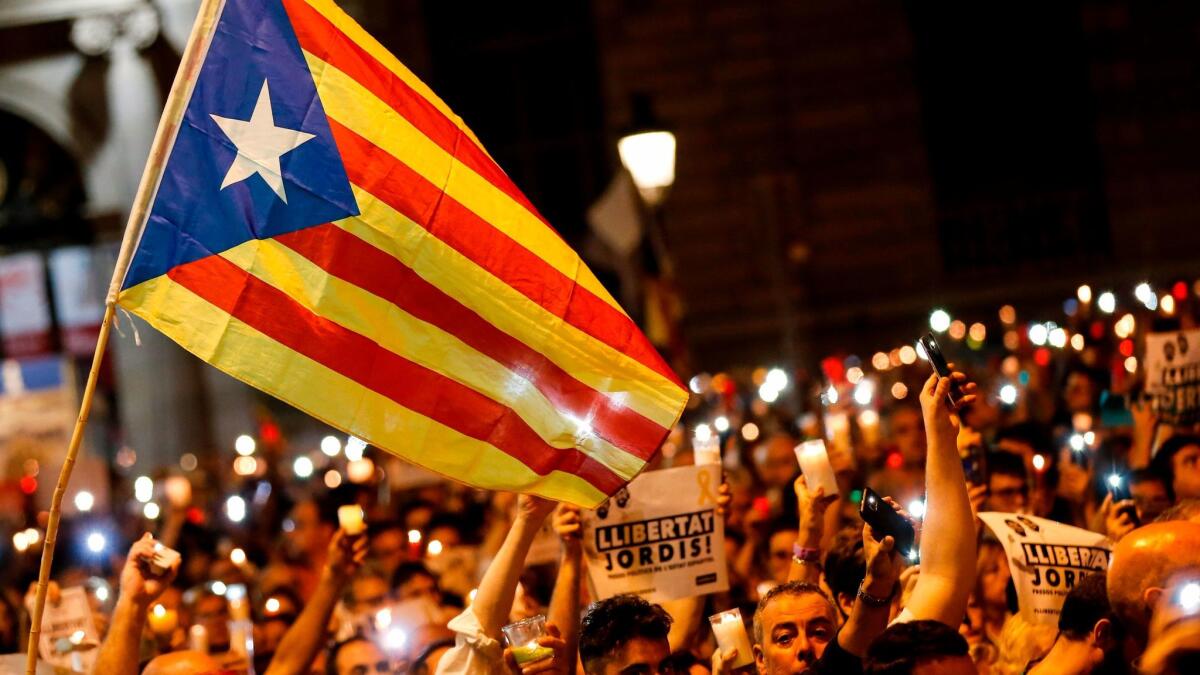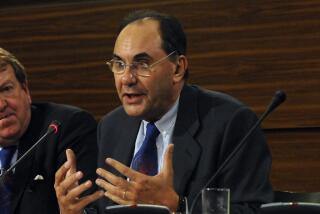Independence crisis intensifies as Spain prepares to strip Catalonia of local powers

Fear, anger and anxiety heightened on both sides of a secession divide as the Spanish government vowed Thursday to take the unprecedented step of stripping autonomous powers from the northeastern region of Catalonia.
The region’s president, Carles Puigdemont, did not renounce independence despite a Thursday deadline imposed by the central government.
The escalating confrontation between Madrid and Spain’s most prosperous region sent ripples of unease across the continent, where European Union leaders are already wary of fissures within the bloc.
Spain’s worst political crisis in nearly four decades of democracy could hamper a still fragile economic recovery in the country as a whole and cause particular financial harm to Catalonia, which is already experiencing a flurry of corporate flight.
Imposition of direct rule by the central government, which would be a first in Spain’s democratic history, raises the specter of violence that could be more widespread than the clashes that accompanied an Oct. 1 independence referendum in Catalonia. In that vote, separatist leaders said 9 out of 10 voters backed independence, but turnout was less than half of the electorate.
Facing a Thursday deadline to back away from independence proclamations, Puigdemont issued a letter that urged dialogue, but threatened to have regional lawmakers vote on an explicit declaration of independence if Madrid does not agree to talks.
The office of Spanish Prime Minister Mariano Rajoy responded by saying the Cabinet would meet in special session Saturday to trigger Article 155 of the nation’s constitution, which allows for the imposition of direct central government rule in any Spanish region in the event of a serious violation of the law.
“The objective is to restore legality in Catalonia,” government spokesman Íñigo Méndez de Vigo said in Madrid moments after Puigdemont’s written response to the deadline.
As the political dispute intensified, popular sentiment appeared to be hardening on both sides as well. In Madrid, Spanish flags have appeared on balconies in recent weeks, and people largely voiced support for Rajoy’s unyielding stance.
“We need to cut out this nonsense,” said Carlotta Badia, 28, on a cigarette break outside her office in downtown Madrid. “I support our government; it’s defending the unity of Spain.”
In Catalonia, anger was growing over what is seen as the Madrid government’s refusal to try to find some compromise.
“Puigdemont wants dialogue with the central government, and they say, ‘No, no, no!’ every time,” said Jordi Costa, 47, a waiter in Barcelona, the Catalan capital. “I think coexistence is now more difficult than ever.”
The accelerating developments threatened a constitutional order that has prevailed for four decades, after the 1975 death of dictator Gen. Francisco Franco.
During Franco’s harsh rule of nearly 40 years, some of Spain’s disparate ethnic and national groups were repressed. The survival of the new Spanish democracy that followed was thought to rest on the devolution of powers to the regions, reversing the centralized power of the dictator.
Spain insists that the independence referendum held Oct. 1 in Catalonia was illegal and that the entire country would have to have a say in whether the region would be allowed to secede. Catalonia, home to 7.5 million people, has its own language and traditions and enjoys a degree of self-rule.
But despite exercising considerable control over their day-to-day affairs, Catalans have chafed at contributing a disproportionate share of wealth to the central tax coffers. Spain is still struggling to throw off the effects of a financial crisis and sees any independence move not only as a threat to the republic but also as a potentially crushing economic blow.
The European Union, fearful of igniting secessionist movements elsewhere, has sided with Spain’s government in the dispute and ignored appeals from Catalan leaders to step in and shepherd talks. Spain has ruled out international mediation.
The independence fray overshadowed talks in Brussels on Thursday by EU leaders, even though they were not officially slated to discuss Catalonia. Rajoy did not speak with reporters as he arrived for the gathering, but other leaders offered backing for Spain’s anti-secessionist stance.
“We support the position of the Spanish government,” German Chancellor Angela Merkel said. French President Emmanuel Macron said the gathering would send a message of “unity around Spain.”
Belgium, which has weathered tension between its French- and Dutch-speaking regions, voiced misgivings about a potential boiling over of the political dispute.
“I condemn all forms of violence,” Belgian Prime Minister Charles Michel said.
If Spain’s Cabinet moves to implement Article 155, a step that would require approval of its Senate, which is controlled by his party, Rajoy would have a range of options at his disposal.
A central government takeover could involve asserting control over Catalonia’s finances, its Interior Ministry and its regional police force. Rajoy could also move to disband the current regional government and call for new Catalan parliamentary elections.
The financial dimensions of the dispute are growing. Catalonia is Spain’s economic engine, accounting for about a fifth of the total economy and more than a quarter of exports. Barcelona is a tourist hub and Spain’s second-largest city. Airlines and Spain’s high-speed rail company have all warned of possible disruptions due to the separatist conflict.
Since the referendum, dozens of Catalan banks and other companies have announced they would move their offices out of Catalonia or change their tax registration to neighboring Spanish provinces if the region secedes from Spain. An independent Catalonia would be forced to leave the European Union, and many companies say they want to retain protection under EU laws.
Such an exodus of companies is “only an appetizer of what could happen if independence were confirmed,” Spanish Economy Minister Luis de Guindos told the national parliament Thursday.
This week, Spain’s government was forced to revise downward its economic growth forecasts amid instability over Catalonia.
Special correspondent Frayer reported from Madrid and Times staff writer King from Washington. Special correspondents Catherine Stupp in Brussels and Leanne Hayman in Barcelona contributed to this report.
ALSO
A global primal scream: #MeToo (#YoTambien #QuellaVoltaChe #גםאנחנו أنا_كمان#)
Sebastian Kurz to be Europe’s youngest leader as Austria swings sharply to the right
UPDATES:
1:30 p.m.: This article was updated with comments from residents in Barcelona and Madrid and background information about the economic consequences of secession.
9:30 a.m.: This article was updated with European leaders’ comments in Brussels and more background on planned Cabinet session.
This article was originally published at 6:35 a.m.
More to Read
Start your day right
Sign up for Essential California for news, features and recommendations from the L.A. Times and beyond in your inbox six days a week.
You may occasionally receive promotional content from the Los Angeles Times.






